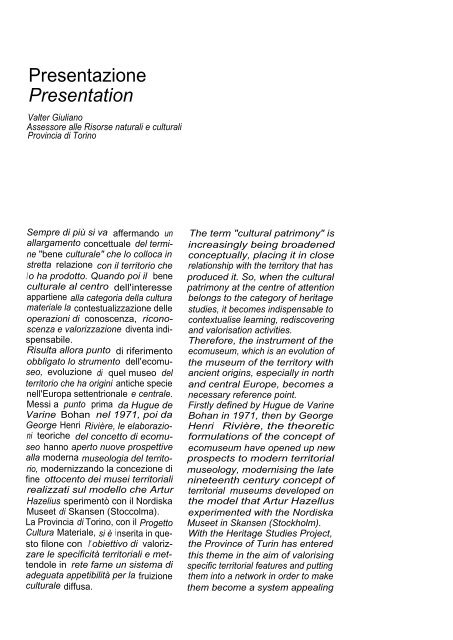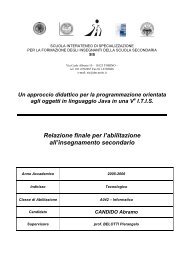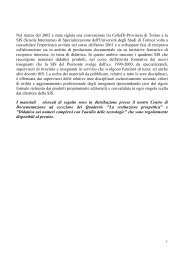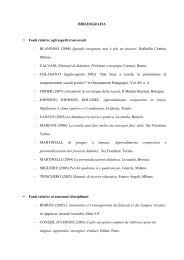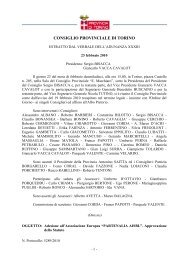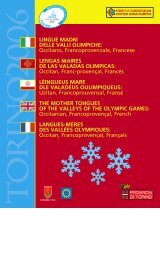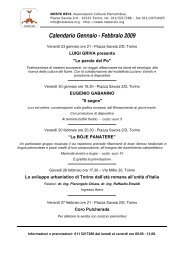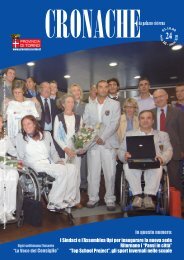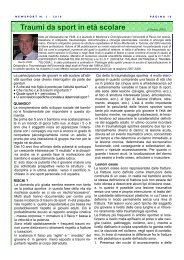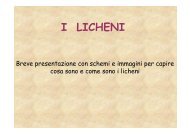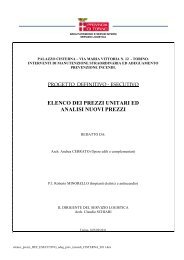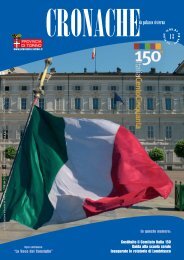Ricerche e proposte per il Progetto Cultura Materiale - Provincia di ...
Ricerche e proposte per il Progetto Cultura Materiale - Provincia di ...
Ricerche e proposte per il Progetto Cultura Materiale - Provincia di ...
Create successful ePaper yourself
Turn your PDF publications into a flip-book with our unique Google optimized e-Paper software.
Presentazione<br />
Presentation<br />
Valter Giuliano<br />
Assessore alle Risorse naturali e culturali<br />
<strong>Provincia</strong> <strong>di</strong> Torino<br />
Sempre <strong>di</strong> più si va affermando un<br />
allargamento concettuale del termine<br />
"bene culturale" che lo colloca in<br />
stretta relazione con <strong>il</strong> territorio che<br />
lo ha prodotto. Quando poi <strong>il</strong> bene<br />
culturale al centro dell'interesse<br />
appartiene alla categoria della cultura<br />
materiale la contestualizzazione delle<br />
o<strong>per</strong>azioni <strong>di</strong> conoscenza, riconoscenza<br />
e valorizzazione <strong>di</strong>venta in<strong>di</strong>spensab<strong>il</strong>e.<br />
Risulta allora punto <strong>di</strong> riferimento<br />
obbligato lo strumento dell'ecomuseo,<br />
evoluzione <strong>di</strong> quel museo del<br />
territorio che ha origini antiche specie<br />
nell'Europa settentrionale e centrale.<br />
Messi a punto prima da Hugue de<br />
Varine Bohan nel 1971, poi da<br />
George Henri Rivière, le elaborazioni<br />
teoriche del concetto <strong>di</strong> ecomuseo<br />
hanno a<strong>per</strong>to nuove prospettive<br />
alla moderna museologia del territorio,<br />
modernizzando la concezione <strong>di</strong><br />
fine ottocento dei musei territoriali<br />
realizzati sul modello che Artur<br />
Hazelius s<strong>per</strong>imentò con <strong>il</strong> Nor<strong>di</strong>ska<br />
Museet <strong>di</strong> Skansen (Stoccolma).<br />
La <strong>Provincia</strong> <strong>di</strong> Torino, con <strong>il</strong> <strong>Progetto</strong><br />
<strong>Cultura</strong> <strong>Materiale</strong>, si è inserita in questo<br />
f<strong>il</strong>one con l'obiettivo <strong>di</strong> valorizzare<br />
le specificità territoriali e mettendole<br />
in rete farne un sistema <strong>di</strong><br />
adeguata appetib<strong>il</strong>ità <strong>per</strong> la fruizione<br />
culturale <strong>di</strong>ffusa.<br />
The term "cultural patrimony" is<br />
increasingly being broadened<br />
conceptually, placing it in close<br />
relationship with the territory that has<br />
produced it. So, when the cultural<br />
patrimony at the centre of attention<br />
belongs to the category of heritage<br />
stu<strong>di</strong>es, it becomes in<strong>di</strong>spensable to<br />
contextualise learning, re<strong>di</strong>scovering<br />
and valorisation activities.<br />
Therefore, the instrument of the<br />
ecomuseum, which is an evolution of<br />
the museum of the territory with<br />
ancient origins, especially in north<br />
and central Europe, becomes a<br />
necessary reference point.<br />
Firstly defined by Hugue de Varine<br />
Bohan in 1971, then by George<br />
Henri Rivière, the theoretic<br />
formulations of the concept of<br />
ecomuseum have opened up new<br />
prospects to modern territorial<br />
museology, modernising the late<br />
nineteenth century concept of<br />
territorial museums developed on<br />
the model that Artur Hazellus<br />
ex<strong>per</strong>imented with the Nor<strong>di</strong>ska<br />
Museet in Skansen (Stockholm).<br />
With the Heritage Stu<strong>di</strong>es Project,<br />
the Province of Turin has entered<br />
this theme in the aim of valorising<br />
specific territorial features and putting<br />
them into a network in order to make<br />
them become a system appealing


